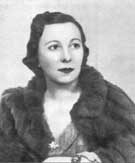
Ned Miller Rorem was an American composer of contemporary classical music and a writer. Best known for his art songs, which number over 500, Rorem was considered the leading American of his time writing in the genre. Frequently described as a neoromantic composer, he showed limited interest in the emerging modernist aesthetic of his lifetime. As a writer, he kept—and later published—numerous diaries in which he spoke candidly of his exchanges and relationships with many cultural figures of America and France.

Grace Melzia Bumbry was an American opera singer, considered one of the leading mezzo-sopranos of her generation, who also ventured to soprano roles. She belonged to a pioneering generation of African-American classical singers, led by Marian Anderson. She was recognized internationally when Wieland Wagner cast her for the 1961 Bayreuth Festival as Venus in Tannhäuser, the first black singer to appear at the festival.

Charlotte "Lotte" Pauline Sophie Lehmann was a German-American lyric soprano noted for her successful performances with international opera houses, on the recital stage and in teaching.She gave memorable appearances in the operas of Richard Strauss, Richard Wagner, Ludwig van Beethoven, Puccini, Mozart, and Massenet. The Marschallin in Der Rosenkavalier, Sieglinde in Die Walküre and the title-role in Fidelio are considered her greatest roles. During her long career, Lehmann also made almost five hundred recordings in both opera and art song.
Brian Asawa was an American countertenor. Opera News said that "in his prime, Asawa was an electric performer, his fearless performing style supported by a voice of arresting beauty and expressivity."
Elodie Lauten was a French-born American composer described as postminimalist or a microtonalist.

Jake Heggie is an American composer of opera, vocal, orchestral, and chamber music. He is best known for his operas and art songs as well as for his collaborations with internationally renowned performers and writers.
The Walter W. Naumburg Foundation sponsors competitions and provides awards for young classical musicians in North America. Founded in 1925, it operates the prestigious Naumburg Competition.
Alice Theresa Hildagard Swanson Esty was an American actress, soprano and arts patron who commissioned works by members of Les Six and other French composers, and American composers such as Ned Rorem, Virgil Thomson. Claire Brook, and Marc Blitzstein, among others.
Martin Boykan was an American composer known for his chamber music as well as music for larger ensembles.

The New York Festival of Song (NYFOS) presents an annual series of concerts in New York City dedicated to the art of song, classical, modern and popular. In addition, this organization commissions new works and recordings, including the Grammy Award-winning recording of Leonard Bernstein's Arias and Barcarolles (Koch), and the Grammy-nominated recording of Ned Rorem's Evidence of Things Not Seen.

Liza Lehmann was an English soprano and composer, known for her vocal compositions.
Paul Alexander Theodore Ulanowsky was an Austrian-American pianist, accompanist, vocal coach, and music educator of Austrian Jewish and Ukrainian-Jewish descent. He began his career as the pianist for the Vienna Philharmonic from 1927 to 1935. He then embarked on a long career as an accompanist, notably enjoying a particularly close relationship with soprano Lotte Lehmann during the last fourteen years of her career. He played in concerts with many of the world's best singers and instrumentalists during the 1940s and 1950s.
William Mayer was an American composer, best known for his prize-winning opera A Death in the Family.

David Serkin Ludwig is an American composer, teacher, and Dean of Music at The Juilliard School. His uncle was pianist Peter Serkin, his grandfather was the pianist Rudolf Serkin, and his great-grandfather was the violinist Adolf Busch. He holds positions and residencies with nearly two dozen orchestras and music festivals in the US and abroad. His choral work, The New Colossus, was performed at the 2013 presidential inauguration of Barack Obama.
Maureen Theresa Lehane Wishart was an English mezzo-soprano singer, university lecturer and founder of the Great Elm Music Festival, Jackdaws Music Education Trust and an annual Vocal Award for young singers. She was known for her recordings and performances of Handel's operas.

"Zueignung" is a Lied composed by Richard Strauss in 1885, setting a poem by the Austrian poet Hermann von Gilm. It was included in Strauss's first published collection of songs, as Op. 10 in 1885. Originally scored for voice and piano, the song was orchestrated in 1932 by the German conductor Robert Heger and in 1940 by Strauss himself. It is one of the composer's best-known songs.

Scott Gendel is an American composer, pianist, and vocal coach. Gendel is known mostly for his art songs and choral music, but has also written numerous operas and musical theatre works, as well as orchestral and chamber music.

Rosalind Phillippa Phillips, OBE, known as Linda Phillips, was an Australian composer, pianist and music critic.
Juliana Hall is an American composer of art songs, monodramas, and vocal chamber music. She has been described by the NATS Journal of Singing as "one of our country’s most able and prolific art song composers for almost three decades" and, in discussing her 1989 song cycle Syllables of Velvet, Sentences of Plush, the Journal went on to assert that "Even at this very early stage in her life and career, Hall knew something about crafting music whose beauty could enhance the text at hand without drawing attention away from that text. This is masterful writing in every respect."

"Wiegenlied", Op. 49, No. 4, is a lied for voice and piano by Johannes Brahms which was first published in 1868. It is one of the composer's most famous pieces.










